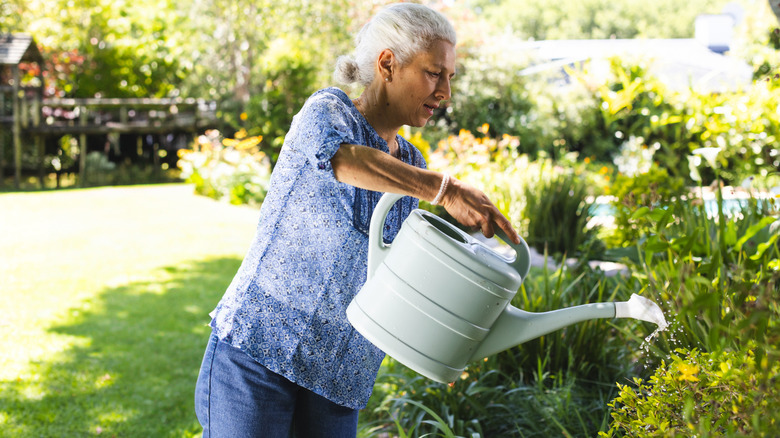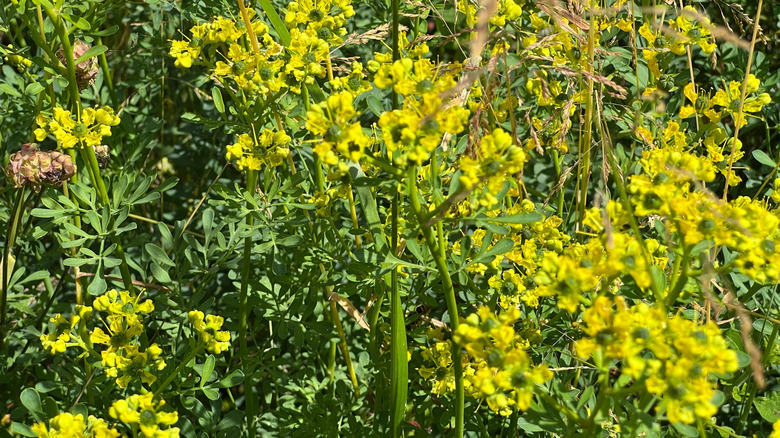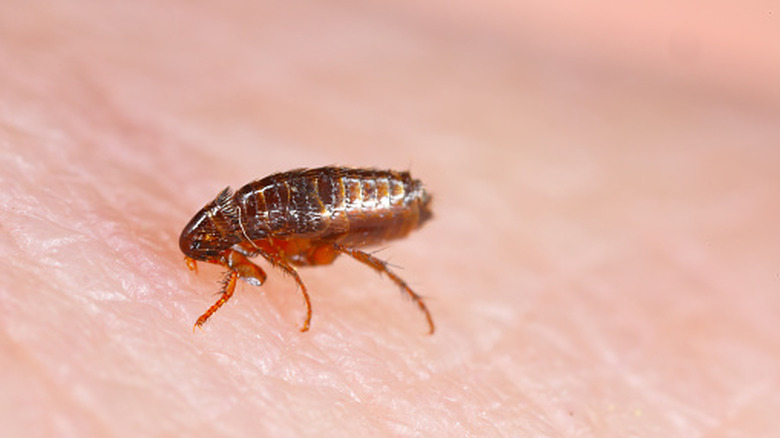The Ornamental Shrub Pollinators Love That Can Naturally Deter Fleas From Your Yard
Fleas might be tiny and somewhat insignificant, however, when a lot of them gather, the situation can quickly spiral from annoying to overwhelming. You might have tried harsh sprays and chemical foggers to push them out but that ends up destroying your plants, too. If you're looking for a natural way to deter fleas from your yard, consider planting common rue (Ruta graveolens). People use rue to get rid of flies, and it actually works. The same is true when it comes to fleas, and the secret is in its intensely aromatic leaves.
Rue generally has a strong and bitter scent, but crushing some leaves and inhaling the scent can be pleasing for us humans. At the same time, pests and fleas are absolutely repulsed by it. The aroma will not kill them, just stop them from showing up in your yard. The scent does keep unwanted bugs and fleas at bay, but it also attracts other pollinators that are good for your yard's ecosystem such as butterflies.
Visually, rue is just as striking. It is a small shrub and its height ranges from 2 inches to 3 feet. It has soft and feathery leaves with bluish green tones, and bright yellow, fringed flowers bloom on it like tiny stars. This gives your garden a beautiful, textured charm.
How to easily grow rue in your yard
Rue is a simple, non-fussy plant that does not ask for much. It grows in USDA Hardiness zones 4 through 10 and requires full to partial sunlight. It likes well-drained soil, and occasionally dry soil also works, so daily watering is not required. The flowers bloom from mid to late summer and make for great garden borders. Once they are planted, they hold shape and do not spread vigorously, so it is a low-maintenance addition to the garden.
The one thing that makes rue effective against fleas and flies is also the reason why it needs to be handled with care. The plant leaves are considered to be of medium poisonous severity and should not be handled without wearing gloves. So while it is a reliable pest deterrent, it is also important to plant it in an area that is not commonly accessible, so pets and children don't accidentally touch it or chew on it.
Rue is an herb that you don't want to plant along with plants such as basil, sage, mint, or cabbage. The health of these herbs tends to decline when planted next to rue. However, there are some plants that thrive when paired with rue, including lavender, raspberries, and roses. With minimal effort, rue offers a natural protection against fleas.
How rue works to deter fleas
Fleas are extremely persistent and can cling tightly to the fur of pets to hitch a ride indoors, spreading infection. Your pets can be treated with topical and oral medications, and hot washing bedding along with regular vacuuming keeps the number of flies inside the home limited, but the most important prevention begins in your yard. Rue helps there, and it is one of the best at-home pest control options your yard could have.
One study examining large parasiticides found that rue shows activity against ticks, mosquitoes, and fleas, especially at the larvae stage. Another study showed that essential oils, or natural plant oils, can be more effective at repelling insects than synthetic repellents such as DEET and permethrin. The study shows that these essential oils can damage growth and other biological systems, including the flea's olfactory system. Rue's essential oil contains 2-undecanone, which has demonstrated a pest-repelling power against fleas.
The strong and bitter scent of rue won't kill the adult fleas outright, but it affects their ability to settle in an area, and your yard becomes less attractive to them. Thus, you can easily use rue as a natural flea-repellent while supporting pollinators.


